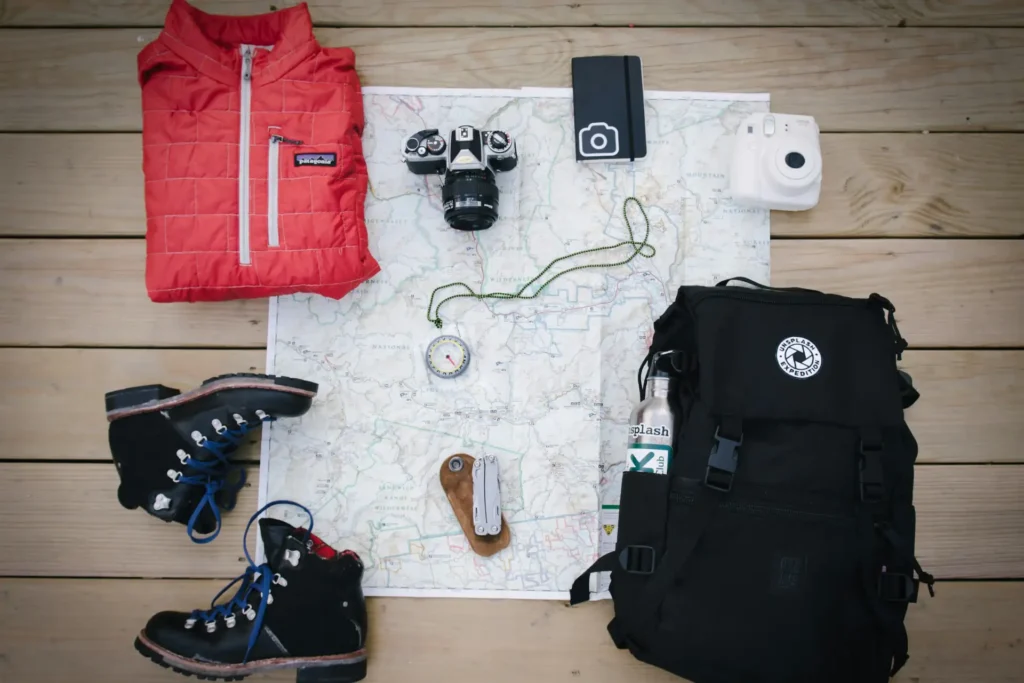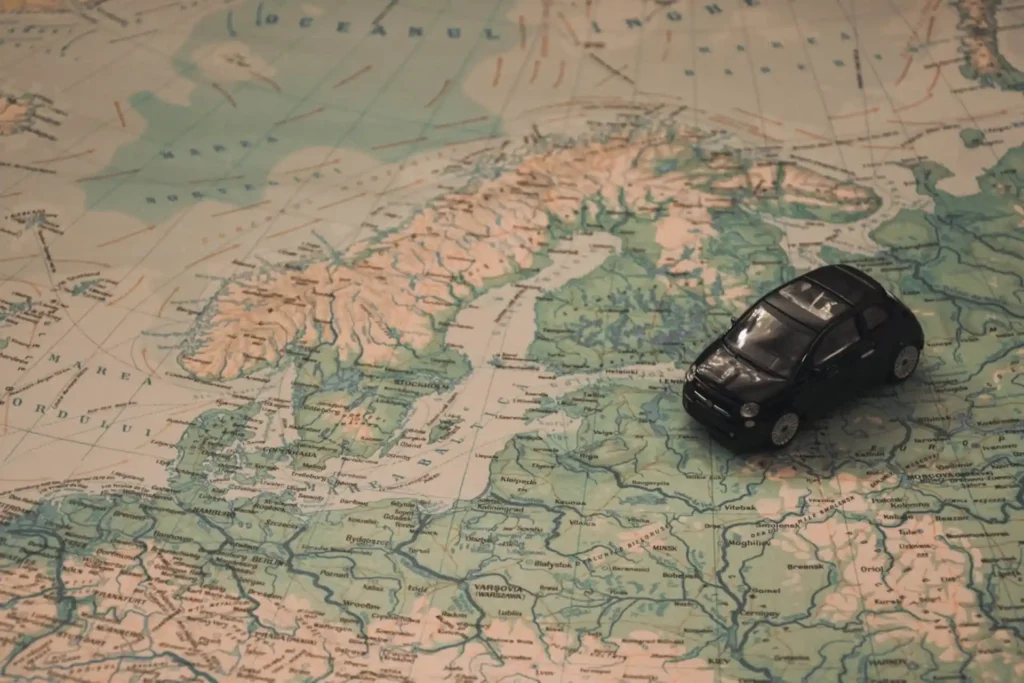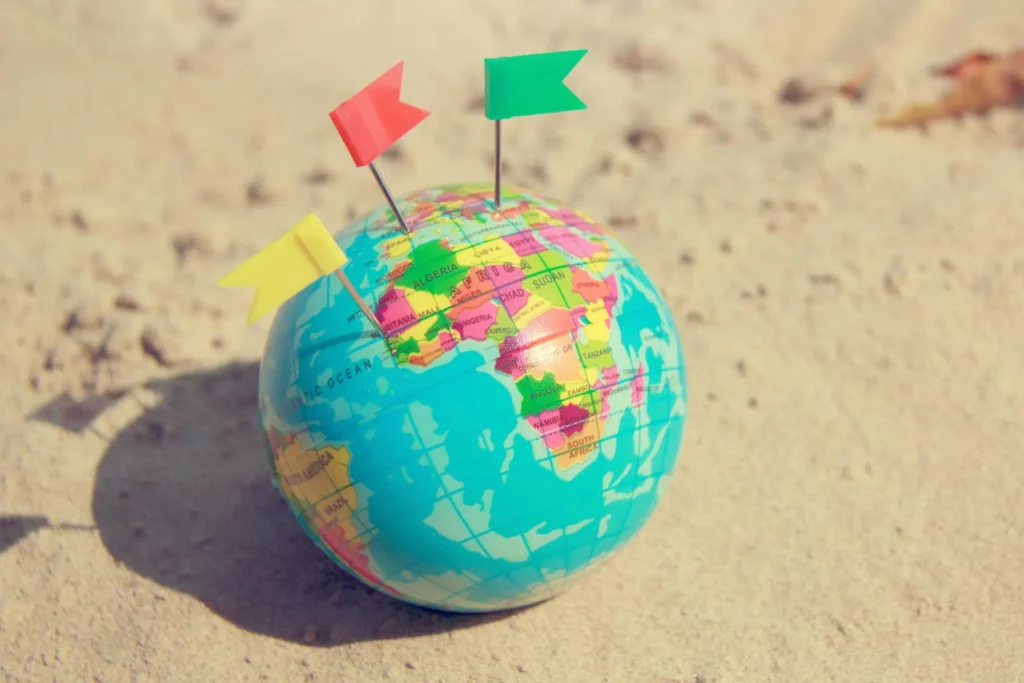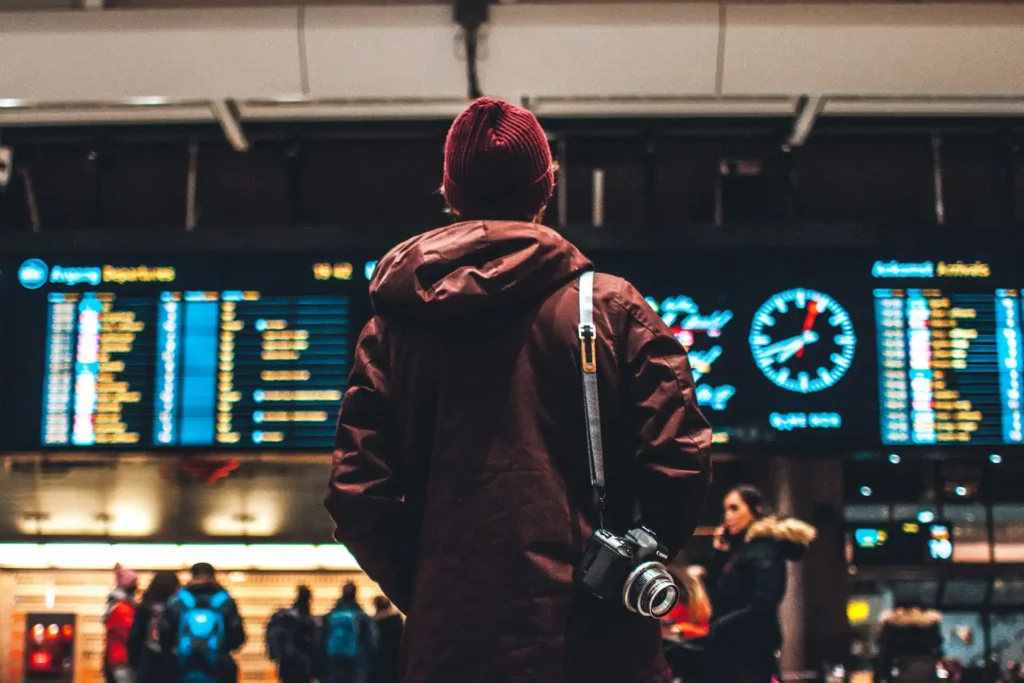Whether backpacking through the Middle East or taking an exotic vacation to North Africa, taking a step to learn Arabic for travel and learning some basic Arabic phrases and words will enrich your travels immensely. As you set out to explore these lands, a basic knowledge of Arabic can immensely enhance your travel experience.
From navigating bustling souks to appreciating historical landmarks, the phrases and cultural insights provided here will serve as your compass. In this insightful guide, we’ll share practical phrases, cultural tips, and motivational insights to take your trips to the next level through the language.
In This Article
Why Learn Arabic for Travel?
While English is widely spoken in many tourist destinations, venturing beyond basic Arabic phrases opens doors to a richer, more meaningful travel experience. Learning Arabic for travel is a gateway to a richer, more authentic travel experience. It allows you to connect with the local culture and people on a deeper level. Here are some compelling reasons why learn Arabic for travel is important and how it can enhance your travels:
- Cultural Immersion: Speaking Arabic opens up opportunities to engage in meaningful conversations, participate in local traditions, and forge connections that transcend cultural barriers.
- Enhanced Travel Experience: Being able to speak Arabic can make your journey much more enjoyable, as you can converse with locals, navigate easily, and discover opportunities that typical tourists might miss.
- Understanding Islam: Arabic plays a significant role in Islam, and learning it can help you understand the history and traditions of one of the world’s major religions. Learn more about Arabic in Islam.
- Economic Benefits: The Middle East is rich in natural resources, particularly oil and gas.Taking a step to Learn Arabic for travel can open many job positions and business opportunities.
- Global Communication: Arabic is spoken by millions of people worldwide, making it a significant language for global communication.
- Personal Growth: Learning Arabic involves overcoming challenging language barriers, which can help develop resilience, emotional intelligence, and social skills.
- Unique Language Structure: Arabic has a complex alphabet and structure, which can improve mental capacities like memory, reasoning, and multitasking.
If you learn Arabic for travel, you’re not just preparing for a trip; you’re opening a window to a new world of experiences, understanding, and connections. Find out more about the benefits of learning Arabic in this detailed article.
Basic Arabic Words for Travel:

Before moving to full phrases, let’s start with some basic Arabic words that are indispensable for any traveler. These include greetings, common questions, and terms related to travel. Mastering these will give you the confidence to initiate conversations and seek assistance when needed when you learn Arabic for travel.
- Greetings:
- السلام عليكم (As-salāmu alaykum) – Hello
- مرحبا (Marhaba) – Hello
- مع السلامة (Ma’a al-Salāma) – Goodbye
- شكرا (Shukran) – Thank you
- عفوا (Afwan) – You’re welcome
- من فضلك (Min Fadlik) – Please
- آسف (Asif) – Sorry
- نعم (Na’am) – Yes
- لا (La) – No
Learn how to pronounce some of the greetings in Arabic:
- Basic Needs:
- Water – ماء (Mā’)
- Food – طعام (Ta’am)
- Bathroom – حمام (Hammām)
- Help – مساعدة (Musā’ada)
- Hospital – مستشفى (Mustashfa)
- Police – شرطة (Shurta)
- Hotel – فندق (Funduq)
- Airport – مطار (Matār)
- Bank – بنك (Bank)
- Market – سوق (Souq)
- How much? – كم – (kam)
- Emergency – طوارئ (Tawāri’)
- Doctor – طبيب (Tabib)
- Pharmacy – صيدلية (Saydaliyah)
- Getting Around:
- تاكسي (Tāksi) – Taxi
- قطار (Qitar) – Train
- حافلة (Ḥāfilah) – Bus
- تذكرة (Tadhkara) – Ticket
- حجز (Hajz) – Reservation
- مطار (Matār) – Airport
- يمين (Yameen) – Right
- يسار (Yasar) – Left
- سفر (Safar) – Travel
- مسافر (Musāfar) – Traveler
- مدينة (Madīnah) – City
- شركة سياحة (Sherket Seyāḥa) – Travel agency
- مخرج (Makhraj) – Exit
- مدخل (Madkhal) – Entrance
- خريطة (Kharita) – Map
- جدول (Jadwal) – Schedule
- معلومات سياحية (Ma’lumat siyāhiya) – Tourist information
Basic Arabic Phrases for Travelers

Equipped with these basic words when you learn Arabic for travel, let’s construct some helpful and basic Arabic phrases for travelers that will come in handy on your adventures:
- Basics:
- I’m from… – أنا من… (Ana min…)
- What’s your name? – ما اسمك؟ (Ma ismuka?)
- My name is… – اسمي… (Ismi…)
- I don’t understand Arabic very well. – لا أفهم العربية جيداً (La afham al-arabiyya jayidan)
- Could you write that down for me? – هل يمكنك كتابة ذلك لي؟ (Hal yumkinuka kitabat dhalika li?)
- I’m looking for… – أبحث عن… (Abhathu ‘an…)
- How do you say this in Arabic? – كيف تقول هذا بالعربية؟ (Kayfa taqulu hadha bil-arabiyya?)
- Speak slowly, please. – تكلم ببطء من فضلك. (Takallam bibut’ min fadlik.)
- Repeat, please. – كرر من فضلك. (Karrer min fadlik.)
- Asking for directions:
- Excuse me, how do I get to…? عذرًا ، كيف أصل إلى…؟. (‘ozran, kayfa aselu ila…)
- Where is…? – أين…؟ (Ayna…?)
- I want to go to… – أريد الذهاب إلى… (Uridu al-dhahāb ila…)
- Straight ahead – مستقيم (Mustaqim)
- Stop here, please. – توقف هنا من فضلك. (Tawaqaf huna min fadlik.)
- Ordering food:
- I would like to order… – أريد أن أطلب… (Uridu an atlub…)
- No meat (for vegetarians) – لا لحوم (la luhum)
- How much is this? – كم سعر هذا؟ (kam se’r hadha)
- Can I see the menu, please? – هل يمكنني رؤية قائمة الطعام؟ (Hal yumkinuni ru`yat qai`mat at-ta’ām?)
- Do you have any vegetarian dishes? – هل عندكم أي أطباق نباتية؟ (Hal ‘indakum ay atbāq nabatiyyah?)
- What do you recommend? – ماذا تنصح به؟ (Madha tansih bih?)
- I will have this one, please. – سآخذ هذا من فضلك. (Sa’akhudh hadha min fadlik.)
- How spicy is it? – ما مدى حرارة هذا؟ (Ma mada harārat hadha?)
- Is this spicy? – هل هذا حار؟ (Hal hadha hār?)
- Can I have a glass of water, please? – هل يمكنني الحصول على كوب من الماء من فضلك؟ (Hal yumkinuni al-husul ‘ala kub min al-mā’ min fadlik?)
- What is the special for today? – ما هو طبق اليوم؟ (Ma huwa tabaq al-yawm?)
- Do you have any desserts? – هل لديكم حلويات؟ (Hal ladaykum halawiyāt?)
- I am allergic to nuts. – أنا لدي حساسية من المكسرات. (Ana ladi hasāsiya min al-mukassarāt.)
- Do you have a gluten-free dish? – هل لديكم طبق خالٍ من الغلوتين؟ (Hal ladaykum tabaq khalin min al-gluten?)
- Do you have a Halal menu? – هل لديكم قائمة حلال؟ (Hal ladaykum qaimah halal?)
- Does it contain meat? – هل يحتوي على لحم؟ (Hal yahtawi ‘ala lahm?)
- Bargaining:
- Can you lower the price? – هل يمكن أن تخفض السعر؟ (hal yumkin an tukhafid al se’r)
- Is there a discount on this item? – هل هناك خصم على هذا المنتج؟ (Hal hunaka khasmun ʻala hadha al-muntaj?)
- Can I try this on? – هل يمكنني تجربة هذا؟ (Hal yumkinuni tajribatu hadha?)
- Do you have this in a different size/color? – هل لديكم هذا بمقاس/بلون مختلف؟ (Hal ladaykum hadha bimaqāsin/bilawnin mukhtalif?)
- It’s too expensive. – غالي جداً. (Ghāli jiddan.)
- Can you give me a better price? – هل يمكنك إعطائي سعرًا أفضل؟ (Hal yumkinuka iʻtāiy saʻran afḍal?)
- I will buy it for… – سأشتريه بـ… (Sa’ashtarihi bi…)
- That’s too much. – هذا كثير. (Hatha kathir.)
- I’m just looking, thank you. – أنا فقط أتفرج، شكراً. (Ana faqat atfarraj, shukran.)
- I’m not interested, thank you. – لست مهتمًا، شكراً. (Lastu muhtaman, shukran.)
- Expressing gratitude:
- Thank you very much – جزاك الله خيرا (Jazāka Allahu khairan) – (literally: May God reward you with good)
- Thank you – شكراً (Shukran)
- Thank you very much – شكراً جزيلاً (Shukran Jazeelan)
- I am grateful to you – أنا ممتن لك (Ana Mumtanun Laka)
- May Allah preserve you – حفظك الله (Hafidhak Allah)
- May Allah bless you – بارك الله فيك (Bārak Allahu Feek)
- General Situations:
- I need a doctor – أحتاج إلى طبيب (Ahtāju ila tabib)
- Can you help me? – هل يمكنك مساعدتي؟ (Hal yumkinuka musā’adati?)
- I’m lost – أنا ضائع (Ana dā’i’)
- Is it far? – هل هو بعيد؟ (Hal huwa ba’eed?)
- I would like to book… – أود حجز… (Awid hajz…)
- I’m allergic to… – أنا أعاني من حساسية تجاه… (Ana o’āni min hasāsiya tujāh…)
- How do I connect to the Wi-Fi? – كيف يمكنني الاتصال بالواي فاي؟ (Kayfa yumkinuni al-ittisāl bil-Wi-Fi?)
- Can I have the menu, please? – هل يمكنني الحصول على القائمة من فضلك؟ (Hal yumkinuni al-husul ‘ala al-qāi’ma min fadlik?)
- Check, please. – الفاتورة من فضلك. (Al-fātura min fadlik.)
- Do you accept credit cards? – هل تقبلون بطاقات الائتمان؟ (Hal taqbalun bitāqāt al-i’timān?)
- Where can I find a taxi? – أين يمكنني إيجاد تاكسي؟ (Ayna yumkinuni ijād tāksi?)
- Is this the road to…? – هل هذا الطريق إلى…؟ (Hal hadhā al-tariq ila…?)
- I would like a room with a view. – أرغب في غرفة مع منظر. (Uridu ghurfa ma’ mandhar.)
- You’re welcome – عفواً (Afuwan)
- No problem – لا مشكلة (Lā mushkila)
- Excuse me (to get attention) – لو سمحت (Law samaht)
- Excuse me (to pass by) – عن إذنك (‘an iznak)
- I’m sorry – أنا آسف (Anā asif)
- It’s okay – على ما يرام (Ala mā yuram)
- Please speak slowly – من فضلك تكلم ببطء (Min fadlik takallam bibut’)
- I don’t speak Arabic well – لا أتكلم العربية جيداً (La atakallamu al-arabiyyata jayyidan)
- Could you repeat that, please? – هل يمكنك تكرار ذلك من فضلك؟ (Hal yumkinuk takrār dhalik min fadlik?)
- I would like to pay – أود الدفع (Uridu ad-daf‘)
- Where is the nearest ATM? – أين أقرب صراف آلي؟ (Ayna aqrab sarrāf ‘ali?)
- What time does it open/close? – متى يفتح/يغلق؟ (Mata yafatah/yughlaq?)
- I need a taxi – أحتاج إلى تاكسي (Ahtāju ila tāksi)
- How long does it take? – كم من الوقت يستغرق؟ (Kam min al-waqt yastaghriq?)
- I’m looking for this address – أبحث عن هذا العنوان (Abhath ‘an hadhā al-‘unwān)
- Can I have a receipt, please? – هل يمكنني الحصول على إيصال من فضلك؟ (Hal yumkinuni al-husul ‘ala iisāl min fadlik?)
Additional: Dua for Traveling in Arabic:
When you start to learn Arabic for travel, it’s necessary to know that In Arabic culture, it is customary to recite dua (supplications) before getting started on a journey or before traveling in general. Here’s a dua you can use:
“الله أكبر – الله أكبر – الله أكبر، سبحان الذي سخر لنا هذا وما كنا له مقرنين وإنا إلى ربنا لمنقلبون. اللهم إنا نسألك في سفرنا هذا البر والتقوى، ومن العمل ما ترضى، اللهم هون علينا سفرنا هذا واطوِ عنا بعده. اللهم أنت الصاحب في السفر، والخليفة في الأهل، اللهم إني أعوذ بك من وعثاء السفر وكآبة المنظر وسوء المنقلب في المال والأهل.”
Translation: “Allah is the greatest – Allah is the greatest – Allah is the greatest. Glory be to Him who has subjected this to us, and we could not have subjugated it. And indeed, to our Lord we will return. O Allah, we ask You for righteousness and piety in this journey of ours, and for the deeds that please you. O Allah, make this journey easy for us and shorten its distance. O Allah, You are the Companion in travel and the Guardian of the family. O Allah, I seek refuge in You from the hardships of travel, the ugliness of the sight, and the bad of the return in money and family.”
Tips for Learning Basic Arabic for Travelers:

To make the most of your Arabic language learning journey, consider the following strategies:
- Start with the Basics:
Begin by learning the Arabic alphabet and ِArabic pronunciation. Familiarize yourself with basic grammar rules, such as sentence structure and verb conjugation. Online resources, language apps, and beginner’s guide books can provide a solid foundation for your learning. In addition, here are some other articles that might be of your interest regarding this point:
- Practice Speaking and Listening:
Immerse yourself in spoken Arabic by listening to podcasts, watching Arabic movies, and engaging in language exchange with native speakers. Practice speaking aloud, even if it’s just talking to yourself or repeating phrases from language learning materials. You can check the following articles to know more about learning these two skills:
- Cultural Sensitivity:
Arabic culture places great importance on respect and politeness. Familiarize yourself with cultural norms, such as appropriate greetings, dress codes, and customs. Showing respect for local traditions will make your interactions more meaningful and enjoyable.
Resources for Learning Arabic for Travel
There are numerous resources available to help you learn Arabic for travel.
- Online Courses: Explore online platforms like ours that offer interactive and survival basic Arabic courses specifically designed for travelers. These courses often focus on basic conversational Arabic to help you survive in any place you travel to, allowing you to practice speaking and comprehension in real-world scenarios. Check our Survival Basic Arabic course to learn more.
- Mobile Apps: Download language learning apps that provide quick access to essential vocabulary and phrases. Many apps even offer voice recognition features to help you perfect your pronunciation.
- Travel Phrasebooks: Invest in a compact travel phrasebook that offers a wider range of vocabulary and phrases categorized by travel situations to learn Arabic for travel.
Conclusion
Your journey with Arabic doesn’t end when your trip does. Encourage continuous learning and exploration of the language, and share how it can enrich future travels and personal growth. With a repertoire of useful Arabic phrases, a foundational understanding of basic Arabic, and cultural sensitivity, you’ll navigate your travels with confidence and respect. Let the Arabic language be your key to immersive experiences, meaningful interactions, and safe travels.
This blog post is just the beginning to guide you to learn Arabic for travel. It’s an invitation to get started on a linguistic adventure that complements the physical one. With each Arabic phrase you learn, you’re not just preparing for a trip; you’re opening a window to a new world. So, pack your bags and your new vocabulary, and get ready for an unforgettable journey where language leads the way to discovery.

